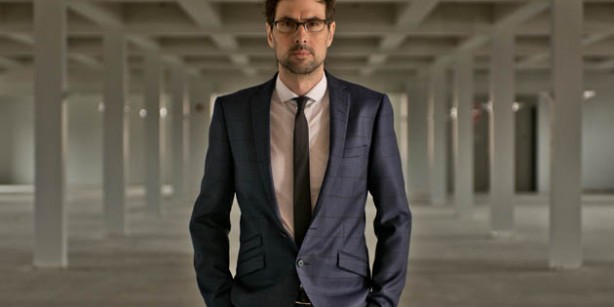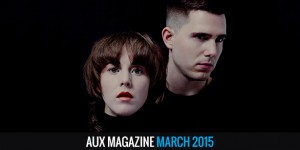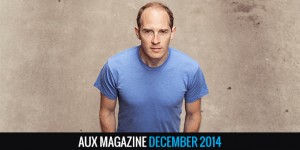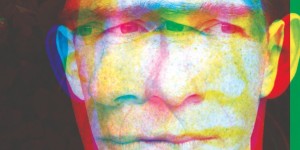 Music
Music
Q&A: DJ Champion fought for his life, then made his most nuanced record yet
by Marsha Casselman
July 15, 2013
In 2010, Maxime Morin was supposed to be celebrating turning the big 4-0 in Montreal, but instead he was fighting for his life.
Photo: Barry Russell
In 2010, Maxime Morin was supposed to be celebrating turning the big 4-0 in Montreal, but instead he was fighting for his life. Diagnosed with stage-3 lymphoma, the Juno-nominated multi-instrumentalist went to a very dark place. He stopped making music. At death’s door, the former metalhead couldn’t handle the vulgarities that had amused him for so long. Cancer had changed his perspective. He needed to heal. Life is too important, and Morin had the conviction he wouldn’t succumb to disease. And with time, chemotherapy and lifestyle change, he succeeded. Today, two years into a clean bill of health, Morin has a new outlook, but he admits the meaning of life is still not so crystal clear. As most artists do, he still suffers and expresses the human condition. So, on his third studio effort as DJ Champion, °1 (pronounced Degree One), you hear Morin’s honesty as he experiences the emotional rollercoster of life and near-death. Through his trademark electro-lounge style (with an added depth of classical music), you’ll hear Morin get real, even if, at times, it requires “extremely bad” singing.
AUX: Your latest album °1 is all over the emotional map – what is the concept behind it?
DJ Champion: The original idea with calling it °1 was thinking, “the first degree,” to keep the album as it is, don’t put too much aesthetic onto the music. I also came into the idea of transparency of the artist. “Cheating On Ma Woman” was recorded with my telephone. Very raw stuff. Most of the time, an artist wants an album that’s very coherent and homogeneous, and that’s okay, but with this I wanted to give the perspective of an artist, of a human being. And a human being is not always coherent. Life is never fun all the time, it can be difficult, it can be sad, it can be good, and the artist can be very talented, or they can be extremely raw. I know I can at times compose beautiful music, but I know when I sing I’m extremely bad. But that’s who I am.
What’s happened in your life over the past three years that found its way into the album?
Perhaps the most obvious feeling that’s expressed with many of these tracks is sensitivity, or fragility. At one point I was close to death, so I’m sharing a bit of that, the fear of death, but then also the appetite for life. “L’envol Du Ciel” is the story of being alive, but closer to your death, and it’s become chaos. It’s not fun. It’s very frightening. But of course that feeling is very important and needs to be expressed.
How have things changed since recovering from cancer?
I appreciate the little things in life, not only the big things. Now it’s been two years (since recovery). Now I go every six months (for a scan and check-up). But every time I’m freaking out, every time I’m anxious – that doesn’t go away very easily. I’m not religious or superstitious, but when I was sick, I was afraid of death, but somehow I was convinced that this was not my time. I don’t know why, but I had the conviction that I wasn’t going to die this time (laughs).
So fighting cancer did not get change your fear of death?
I think it would be quite pretentious to say that it did. Of course it changed my perspective on life. Everyone who goes through this near-death experience starts to appreciate the little things of life. But it’s weird, I was going to die in two months, and that puts you in a mindset that is very different, so different that I can’t remember how I used to see life. For example, I like vulgarity, I speak dirty and I love it, but when I was sick, I couldn’t hear any dirty words at all. It felt bad. It felt disrespectful to life. I don’t know. I don’t know why. But I can’t go back and remember. If I was able to see life like I did at that time, I would remember why it was so uncomfortable. That is what the song “Dead Before” talks about. It’s like when you’re a baby, you don’t remember before you’re two years old, but I think we have lots of memories from that time, we just can’t understand these memories. When you saw a chair, but you didn’t know it was a chair, or you saw a TV, but you didn’t know it was a TV, you didn’t understand how to use things, so you understood them in a drastically different way. Your memories of these things had different emotional pictures. I wanted to have this different way of viewing the world on the album.
Sound-wise, you are known as a DJ and produce electronic, but you roots are in guitar. How do you choose what style to compose in?
With the whole album, I tried to polarize the musical styles – very beautiful or very thrashy. If you were to compose an opera, you’d probably want to do it in Italian; if you want to express anger, you’d use heavy metal; if you want to express happiness and joy, you’d probably go for house music; it’s feel-good music. If you want to express fragility and soft emotions, you’d use classical, violins, or woodwinds. Of course you can mix it all up, but there are some obvious ways to use certain instruments.
The orchestral bend to this album certainly differs from your past in techno and even going back to your heavy metal youth. Do you still tap into your metal past, or have you moved on?
Oh yeah, it’s still alive, it’s still burning. With the new album, some people told me it’s more mature. But I’m still a fucked-up teenager somewhere inside. I do not turn my back on my heavy metal side, or my pop-music side. That’s why I put “No Love Enough” on the album. It’s a cold pop song – but I like it.
How will fans view the new material?
It’s really up to the listener to decide. But I’m an artist. That’s the purpose of being an artist, you can just do it – no justification. If you need justification, you should be a lawyer, not an artist.

This article originally appeared in the July 2013 Issue of AUX Magazine.
Download and subscribe for free in the app store.
Tags: Music, Cancon, Interviews, AUX Magazine, dj champion





